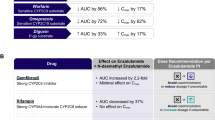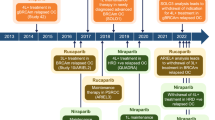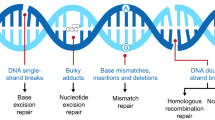Abstract
A DNA polymorphism is one of the most important factors determining individual variations in patients’ responses to the same medicinal preparations. This work deals with assessment of associations between polymorphisms of 106 genes involved in key processes of cellular activity (xenobiotic metabolism, DNA repair, the cell cycle, and the regulation of apoptosis) and the outcomes of a cisplatin-based chemotherapy in a cohort of ovarian-cancer patients from Yakutia. The CDKN1B gene polymorphism (rs34330) has been found to be associated with the frequency of complete remissions. The allelic status of this locus was also shown to be significant for progression-free survival. The allelic status at the EPXH1 gene loci (rs2234922 and rs2260863) correlated with impairments in hearing, while the NBN gene polymorphism (rs1063045) was associated with severe emesis.
Similar content being viewed by others
References
Kelland, L., The resurgence of platinum-based cancer chemotherapy, Nat. Rev. Cancer, 2007, vol. 7, no. 8, pp. 573–584.
Muggia, F., Platinum compounds 30 years after the introduction of cisplatin: implications for the treatment of ovarian cancer, Gynecol. Oncol., 2009, vol. 112, no. 1, pp. 275–281.
Prakticheskie rekomendatsii po lecheniyu zlokachestvennykh opukholey Obschestva onkologov-khimioterapevtov RUSSCO, 2012 (Practical Recommendations for the Treatment of Malignant Tumors of the Society of Oncologists and Chemotherapeutists RUSSCO, 2012). http://www.rosoncoweb.ru/standarts/RUSSCO/
Rabik, C.A. and Dolan, M.E., Molecular mechanisms of resistance and toxicity associated with platinating agents, Cancer. Treat. Rev., 2007, vol. 33, no. 1, pp. 9–23.
Monzó, M., Navarro, A., Ferrer, G., and Artells, R., Pharmacogenomics: A tool for improving cancer chemotherapy, Clin. Transl. Oncol., 2008, vol. 10, no. 10, pp. 6218–637.
O’Donnell, P.H. and Ratain, M.J., Germline pharmacogenomics in oncology: Decoding the patient for targeting therapy, Mol. Oncol., 2012, vol. 6, no. 2, pp. 251–259.
Jung, Y. and Lippard, S.J., Direct cellular responses to platinum-induced DNA damage, Chem. Rev, 2007, vol. 107, no. 5, pp. 1387–1407.
HuGE Navigator: An Integrated, Searchable Knowledge base of Genetic Associations and Human Genome Epidemiology. http://hugenavigator.net/HuGENavigator/home.do. Accessed February 27, 2013.
Khrunin, A., Ivanova, F., Moisseev, A., Khokhrin, D., Sleptsova, Y., Gorbunova, V., et al., Pharmacogenomics of cisplatin-based chemotherapy in ovarian cancer patients of different ethnic origins, Pharmacogenomics, 2012, vol. 13, no. 2, pp. 171–178.
Milligan, B.G., Total DNA isolation, in Molecular Genetic Analysis of Populations, Hoelzel, A.R., Ed., London: Oxford Univ. Press, 1998, pp. 29–60.
Liu, K. and Muse, S.V., Powermarker: An integrated analysis environment for genetic marker analysis, Bioinformatics, 2005, vol. 21, no. 9, pp. 2128–2129.
Landa, I., Montero-Conde, C., Malanga, D., De Gisi, S., Pita, G., Leandro-Garcia, L.J., et al., Allelic variant at −79 (C > T) in CDKN1B (p27Kip1) confers and increased risk of thyroid cancer and alters mRNA levels, Endocr.-Relat. Cancer, 2010, vol. 17, no. 2, pp. 317–328.
Zhuang, Y., Yin, H.T., Yin, X.L., Wang, J., and Zhang, D.P., High p27 expression is associated with a better prognosis in East Asian non-small cell lung cancer patients, Clin. Chim. Acta, 2011, vol. 412, nos. 23–24, pp. 2228–2231.
Xu, J.L., Hu, L.M., Huang, M.D., Zhao, W., Yin, Y.M., Hu, Z.B., et al., Genetic variants of NBS1 predict clinical outcome of platinum-based chemotherapy in advanced non-small cell lung cancer in Chinese, Asian Pac. J. Cancer. Prev., 2012, vol. 13, no. 3, pp. 851–856.
Liu, Y., Webb, H.K., Fukushima, H., Micheli, J., Markova, S., Olson, J.L., et al., Attenuation of cisplatin-induced renal injury by inhibition of soluble epoxide hydrolase involves nuclear factor kB signaling, J. Pharmacol. Exp. Ther., 2012, vol. 341, no. 3, pp. 725–734.
Deavall, D.G., Martin, E.A., Horner, J.M., and Roberts, R., Drug-induced oxidative stress and toxicity, J. Toxicol., 2012, vol. 2012, pp. 645–660.
Author information
Authors and Affiliations
Corresponding author
Additional information
Original Russian Text © D.V. Khokhrin, A.V. Khrunin, F.G. Ivanova, A.A. Moisseev, V.A. Gorbunova, S.A. Limborska, 2013, published in Molekulyarnaya Genetika, Mikrobiologiya i Virusologiya, 2013, No. 4, pp. 6–9.
About this article
Cite this article
Khokhrin, D.V., Khrunin, A.V., Ivanova, F.G. et al. Pharmacogenomics of cisplatin-based chemotherapy in ovarian-cancer patients from Yakutia. Mol. Genet. Microbiol. Virol. 28, 137–140 (2013). https://doi.org/10.3103/S0891416813040034
Received:
Published:
Issue Date:
DOI: https://doi.org/10.3103/S0891416813040034




